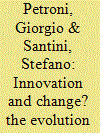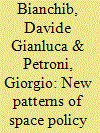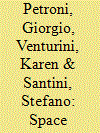|
|
|
Sort Order |
|
|
|
Items / Page
|
|
|
|
|
|
|
| Srl | Item |
| 1 |
ID:
111260


|
|
|
|
|
| Publication |
2012.
|
| Summary/Abstract |
Since the 1980s a trend has emerged to contain the cost of space missions, which has favored trials in the construction and launch of small satellites. This effort has considerably reduced the cost of the satellites because the construction process uses both traditional components and important technological innovations. There have also been market openings for small satellites, both within the telecommunication sector and for scientific missions and those related to Earth observation. This paper contains the results of a survey of the largest manufacturers of small satellites in Europe and investigates how far (if at all) they have changed the structure of the European space industry. It finds that, through the acquisition of small satellite manufacturers, traditional large companies operating in the field of space in Europe have secured for themselves important technological innovations and market opportunities, while maintaining their oligopolistic position.
|
|
|
|
|
|
|
|
|
|
|
|
|
|
|
|
| 2 |
ID:
157172


|
|
|
|
|
| Summary/Abstract |
This paper aims to study the new generation of space policy, analyzing the factors that are pushing towards a new configuration: the new political actors active in this field – developing countries, particularly the BRICs – and the market forces. The objective is to identify the critical factors that are changing the character of space policy. Thanks largely to the interviews conducted in the field, it has been possible to identify three elements which concur to shape a “new pattern” of space policy: the new generation satellites (so called “small satellites”); the ability to launch and the platforms from which to put satellites into orbit; GNSS (Global Navigation Satellite Systems) signals that several space agencies are trying to refine in order to become independent from US influence, exerted by “global” supplying of the GPS (Global Positioning System) signal. In conclusion it is therefore possible to reaffirm that space policy is one of the most evident indicators of the changes taking place in post-Cold War politics, and at the same time they are in themselves a critical factor in the definition – and continuous re-definition – of the political hierarchies in the international arena.
|
|
|
|
|
|
|
|
|
|
|
|
|
|
|
|
| 3 |
ID:
094099


|
|
|
|
|
| Publication |
2010.
|
| Summary/Abstract |
The paper reports research into the transfer of technology typically used in the construction of scientific satellites. Four case studies are analyzed to clarify some basic mechanisms of the transfer of space technology to the industrial system. The paper finds that the technologies analyzed in the construction of satellites for the most part stem from the integration of technical processes already known in various industrial sectors; the use of these processes in space involves their substantial strengthening and upgrading in terms of performance; and this upgrading permits them to return to industrial sectors that use the technological advances acquired for coping with complex problems in the space sector. This research has helped validate some of the determinants of technology transfer already noted in the literature, while increasing the number and content of these. Useful indications emerge for policy makers and agents involved in technology transfer programs.
|
|
|
|
|
|
|
|
|
|
|
|
|
|
|
|
| 4 |
ID:
127543


|
|
|
|
|
| Publication |
2013.
|
| Summary/Abstract |
The following paper reports the results of a research work carried from 2008 on the topic of strategies and determinants of space technology Transfer (TT). In particular, the aim of this study is to present: 1. The policies and strategies the major space agencies adopt for TT, 2. The operational mechanisms and determinants involved in the transfer of space technologies to other industrial sectors. To this extent we have conducted in the last five years: six case studies of large space agencies, four TT case studies concerning the construction of scientific satellites, two case studies focused on space to earth TT programs undertaken by the Japanese aerospace agency, and two TT case studies examining Italian space companies.
The comparative and comprehensive analyses of these studies indicate that the space agencies of the more industrialized countries aim primarily at consolidating and developing the industrial systems in their own countries, which include the use of technology transfer programs, and that the transfer of space technologies follows the route "Earth-Space-Earth". With regard to the determinants of the TT process, the most important of these correlate with the type of technology in transfer, whereas organizational, economic and financial determinants have less significance.
|
|
|
|
|
|
|
|
|
|
|
|
|
|
|
|
|
|
|
|
|